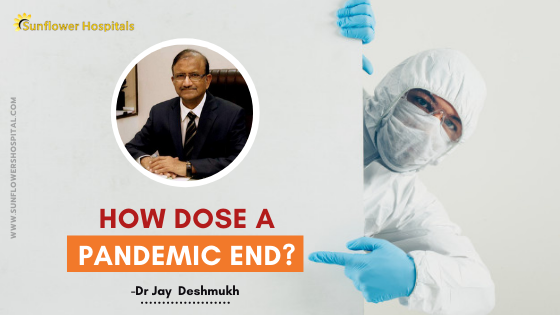A pandemic is a worldwide spread of a new disease. A disease occurring over a wide geographical area and affecting an exceptionally high proportion of individuals is a pandemic. A pandemic is basically a global epidemic that spreads to more than one continent.
What have been the major pandemics in history so There have been a number of pandemics in history so far?
Smallpox and tuberculosis were also pandemics. The most fatal pandemic recorded in history was the plague, that killed more than 75 to 200 million people in the 14 th century. Current pandemics include HIV/AIDS and Covid-19 viral infection.
How will Covid-19 end?
As of now 30 million people have been affected and has resulted in the deaths of at least 1 million. What emerged in December 2019 in Wuhan, China as a common cold-like virus causing pneumonia, has engulfed more than 213 countries.
Though scientists are working hard to find a vaccine, a question that always is debated is how will the pandemic end?
Though throughout history many pandemics have occurred and have taken at least two to three years, the answer is elusive. The first option is the medical ending of the pan-demic. The medical ending will come after the development of a safe and effective vaccine and we follow-ing the social protocols strictly
What is the status of a vaccine against COVID today?
As of now, more than 165 vaccine candidates are currently in different stages of preclinical and clinical trials. More than 33 vaccines have reached the last stage of the trial. Even though the vaccine will not be completely effective, it will prevent the spread of the pandemic.
How effective is the vaccine likely to be?
According to Dr Anthony Fauci, a top infectious dis-ease expert, a vaccine that is safe and 50 to 60 per cent effective will be acceptable. Scientists are working hard to make it at least 75 per cent effective. Early results of the vaccine have been encouraging and we expect an rn-reasonably effective vaccine by early 2021. What was the experience of the deadly Spanish flu? In the Spanish flu, more than 500 million people were affected. About 1per cent of the world’s population was wiped out. The pandemic ended after 2 long years when people gained immunity against the virus. When more and more people venture out, more and more people get affected and get immunity against the virus. However; the social ending comes with a huge price.
What happens now to the SARS Covid-19 epidemic?
According to the health experts, we may be able to slow down the epidemic, but will not be able to wipe it out. The focus should be on slowing the spread of the disease. It can only be achieved by vaccination, physical distancing and herd immunity. The combination of all three will slow down the disease. It may take 2 years to reduce the pandemic significantly.
What is herd immunity and can we achieve it?
When most of the people are immune to an infer, on, this provides protection to the non-immune population. For example, if 80 per cent of a population are immune to a virus, then four out of every five people exposed to the virus would not get infect-ed and would not spread the disease. In this way, the infection does not spread. Depending on how contagious infection is, usually, 50 % to 90% of the population needs immunity to achieve herd immunity.
Have we achieved herd immunity for other infections?
Mumps, measles, chickenpox and polio are less common than a few decades ago. Some viruses change their character over a period of time. Hence even if you had flu earlier, you may still get it after a few months or years. This is because the virus undergoes mutation. Individuals who have had Covid-19 infection may have immunity for a few months or years. However, they should not expect lifelong immunity.
How can we have herd immunity with SARS-CoV- 2?
There are two ways. Either many individuals get infected and develop immunity for some period of time, or a protective vaccine is administered to all individuals. If we do not maintain physical distancing, a large number of people will get infected, this will lead to many deaths. A large number of patients will overwhelm our hospitals. It is not a good idea to get infected in spite of a short term immunity as the dis-ease is highly unpredictable at present. The current death rate due to SARS-CoV-2 is 10 times higher than flu.
What should we expect in the coming months?
As most of the population still remains uninflected with SARS- CoV-2, some measures would be required to prevent explosive outbreaks. The pres-ent pattern will continue for a few months more with some serious outbreaks. We cannot expect a herd immunity. We should neither expect one, as this would mean a very large number of people getting infected. With our limited resources and poor finances, we can ill afford a herd immunity due to exposure to the virus per say. Till this pandemic ends, perhaps in a year or two, we need to protect our-selves from this deadly and unpredictable virus. Physical distancing, N-95 mask and frequent hand washing is the key to unlock the puzzle of SARS-CoV-2 infection. Please pray that our scien-tists get success in getting a vaccine as early as possible to mitigate the sufferings of billions of people.
Author: Dr Jay Deshmukh
Dr Jay Deshmukh is Chief Physician and Director, Sunflower Hospital, Nagpur Honorary Physician to Honorable Governor of Maharashtra and PondicherryCentral. Dr Jay Deshmukh is an M.B.B.S., M.C.P.S., F.C.P.S., M.N.A.M.S., MD From Internal Medicine – Bombay and New Delhi.


